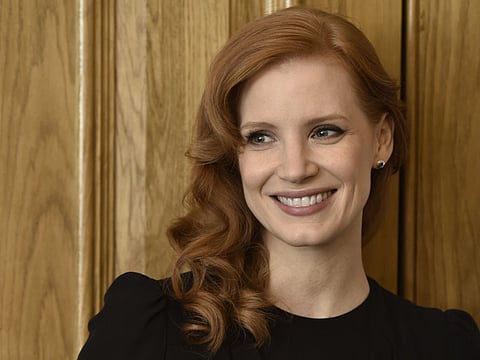Jessica Chastain calls for more opportunities for female directors
Oscar-nominated actor calls out Hollywood for its troubling gender gap and calls on the industry to do more than mere tokenism

Jessica Chastain is no stranger to using her power in Hollywood as one of her industry’s most sought-after actors to fight for gender equality.
Most recently, the actor, who embraces the term “feminist”, called out the sexualisation of female superheroes in blockbusters while promoting The Martian. She also joined Jennifer Lawrence’s call to arms on the gender pay disparity in Hollywood, saying: “I think everyone should talk about it.” On Tuesday, the Hollywood Reporter published as essay by Chastain, in which she relays the positive experience of working on her upcoming film, The Zookeeper’s Wife, because it boasts a largely female crew. “I’ve never been on a set with so many women,” she writes. “We’re not even 50 per cent of the crew — we’re probably something like 20 per cent women and 80 per cent men — but it’s way more than I’ve ever worked with on a film before.” The film, based on popular nonfiction novel by Diane Ackerman, boasts a female director (Niki Caro — best known for Whale Rider), three female producers and a female protagonist, played by Chastain.
In The Zookeeper’s Wife, the Oscar-nominated actor plays Antonina Zabinski, who along with her husband, Jan Zabinski, ran the Warsaw Zoo during the Second World War. The couple saved hundreds of people, and animals, by hiding them in zoo cages during the Nazi invasion. The film is set for release in 2016.
Chastain has shot 21 features since breaking onto the scene in 2008 — four have been directed by women, including Kathryn Bigelow (Zero Dark Thirty), and Liv Ullmann (Miss Julie). Not a bad figure, considering only 7 per cent of the directors of the 250 top-grossing Hollywood-produced films were women — down 2 per cent on the equivalent figure for 1998 — in 2014. “For me, sex really isn’t the qualifier in the way someone directs — but I just know that when you have a set with predominantly one gender, whether it be all men or all women, it’s not going to be a healthy place,” Chastain writes. “I imagine it’s the same thing in the workforce or other environments: When you have both genders represented, then you have a healthier point of view. The energy is great, you all are working together as a community, and everyone is participating in the exchange of ideas. You don’t feel a hierarchy; you don’t have anyone feeling like they are being left out or bullied or humiliated. Sometimes being the only girl on a set, you can feel like a sexual object.”
In her essay, Chastain references Viola Davis’s recent Emmy awards speech, during which her co-star from The Help said: “The only thing that separates women of colour from anyone else is opportunity.”
Writes Chastain: “It’s the same situation with female directors versus male directors — they are not given the same opportunity.”
In her essay, Chastain alludes to an assumption made by Jurassic World director Colin Trevorrow, who caused a stir after tweeting: “Many of the top female directors in our industry are not interested in doing a piece of studio business for its own sake. These filmmakers have clear voices and stories to tell that don’t necessarily involve superheroes or spaceships or dinosaurs.”
Chastain writes: “It’s not a valid excuse to say women don’t call asking to direct superhero movies. Every female director I’ve asked if she’d be interested in directing a big movie like that says, ‘Hell, yeah.’ And if that’s true, it shows how deep-seated the problem is. I don’t think the problem is women; it’s the representation. It goes to the agents. It has to change. This is 2015.”
Still, Chastain writes that she remains hopeful. “I do think things are changing,” she writes. “The reason I think they are changing is because whenever I talk about these issues with men I know in the industry — they are very talented, really intelligent and very successful men — there’s this embarrassment. They say, ‘I don’t understand how it got to be like this.’ And I think that is what will help things change because it takes the group that is the majority in the industry to say, ‘Wait a minute: Maybe it’s more interesting to have more female voices in the executive suite and not just a token woman.’”
Sign up for the Daily Briefing
Get the latest news and updates straight to your inbox



